新概念英语第2册Lesson85~87课文翻译及词汇(最新)
- 格式:doc
- 大小:31.50 KB
- 文档页数:5
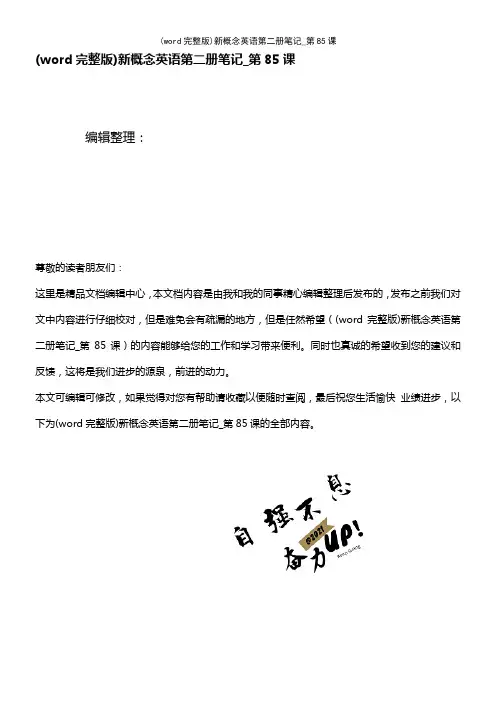
(word完整版)新概念英语第二册笔记_第85课编辑整理:尊敬的读者朋友们:这里是精品文档编辑中心,本文档内容是由我和我的同事精心编辑整理后发布的,发布之前我们对文中内容进行仔细校对,但是难免会有疏漏的地方,但是任然希望((word完整版)新概念英语第二册笔记_第85课)的内容能够给您的工作和学习带来便利。
同时也真诚的希望收到您的建议和反馈,这将是我们进步的源泉,前进的动力。
本文可编辑可修改,如果觉得对您有帮助请收藏以便随时查阅,最后祝您生活愉快业绩进步,以下为(word完整版)新概念英语第二册笔记_第85课的全部内容。
Lesson 85 Never too old to learn 活到老学到老【Text】I have just received a letter from my old school, informing me that my former headmaster, Mr。
Stuart Page, will be retiring next week. Pupils of the school, old and new, will be sending him a present to mark the occasion。
All those who have contributed towards the gift will sign their names in a large album which will be sent to the headmaster's home。
We shall all remember Mr. Page for his patience and understanding and for the kindly encouragement he gave us when we went so unwillingly to school。
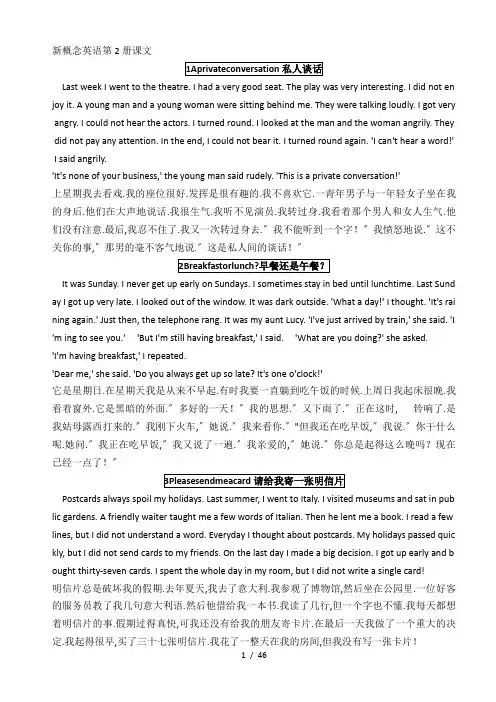
新概念英语第2册课文Last week I went to the theatre. I had a very good seat. The play was very interesting. I did not en joy it. A young man and a young woman were sitting behind me. They were talking loudly. I got very angry. I could not hear the actors. I turned round. I looked at the man and the woman angrily. They did not pay any attention. In the end, I could not bear it. I turned round again. 'I can't hear a word!' I said angrily.'It's none of your business,' the young man said rudely. 'This is a private conversation!'上星期我去看戏.我的座位很好.发挥是很有趣的.我不喜欢它.一青年男子与一年轻女子坐在我的身后.他们在大声地说话.我很生气.我听不见演员.我转过身.我看着那个男人和女人生气.他们没有注意.最后,我忍不住了.我又一次转过身去.〞我不能听到一个字!〞我愤怒地说.〞这不关你的事,〞那男的毫不客气地说.〞这是私人间的谈话!〞It was Sunday. I never get up early on Sundays. I sometimes stay in bed until lunchtime. Last Sund ay I got up very late. I looked out of the window. It was dark outside. 'What a day!' I thought. 'It's rai ning again.' Just then, the telephone rang. It was my aunt Lucy. 'I've just arrived by train,' she said. 'I 'm ing to see you.' 'But I'm still having breakfast,' I said. 'What are you doing?' she asked.'I'm having breakfast,' I repeated.'Dear me,' she said. 'Do you always get up so late? It's one o'clock!'它是星期日.在星期天我是从来不早起.有时我要一直躺到吃午饭的时候.上周日我起床很晚.我看着窗外.它是黑暗的外面.〞多好的一天!〞我的思想.〞又下雨了.〞正在这时, 铃响了.是我姑母露西打来的.〞我刚下火车,〞她说.〞我来看你.〞"但我还在吃早饭,〞我说.〞你干什么呢.她问.〞我正在吃早饭,〞我又说了一遍.〞我亲爱的,〞她说.〞你总是起得这么晚吗?现在已经一点了!〞Postcards always spoil my holidays. Last summer, I went to Italy. I visited museums and sat in pub lic gardens. A friendly waiter taught me a few words of Italian. Then he lent me a book. I read a few lines, but I did not understand a word. Everyday I thought about postcards. My holidays passed quic kly, but I did not send cards to my friends. On the last day I made a big decision. I got up early and b ought thirty-seven cards. I spent the whole day in my room, but I did not write a single card!明信片总是破坏我的假期.去年夏天,我去了意大利.我参观了博物馆,然后坐在公园里.一位好客的服务员教了我几句意大利语.然后他借给我一本书.我读了几行,但一个字也不懂.我每天都想着明信片的事.假期过得真快,可我还没有给我的朋友寄卡片.在最后一天我做了一个重大的决定.我起得很早,买了三十七张明信片.我花了一整天在我的房间,但我没有写一张卡片!I have just received a letter from my brother, Tim. He is in Australia. He has been there for six mo nths. Tim is an engineer. He is working for a big firm and he has already visited a great number of di fferent places in Australia. He has just bought an Australian car and has gone to Alice springs, a sma ll town in the centre of Australia. He will soon visit Darwin. From there, he will fly to Perth. My brot her has never been abroad before, so he is fending this trip very exciting.我刚刚收到弟弟的来信,提姆.他在澳大利亚.他有六个月了.提姆是一个工程师.他是一家大公司工作,他已经访问了许多不同的地方在澳大利亚.他刚买了一辆汽车和澳大利亚已经向爱丽丝斯普林斯,一个小镇的中心,澳大利亚.他将很快访问达尔文.从那里,他再飞往珀斯.我兄弟从来没有出过国,因此他觉得这次旅行非常激动.Mr.James Scott has a garage in Silbury and now he has just bought another garage in Pinhurst. Pi nhurst is only five miles from Silbury, but Mr. Scott cannot get a telephone for his new garage, so he has just bought twelve pigeons. Yesterday, a pigeon carried the first message from Pinhurst to Silbu ry. The bird covered the distance in three minutes. Up to now, Mr.Scott has sent a great many reque sts for spare parts and other urgent messages from one garage to the other. In this way, he has beg un his own private 'telephone' service.杰姆斯先生在锡尔伯里有一个汽车修理厂史葛,现在他刚在平赫斯特买了另一个汽车修理厂.只从炽热玻璃的五英里,但史葛先生未能为他新的汽车修理部得到一个机,所以他买了十二只鸽子.昨天,鸽子把第一封信从.鸟覆盖的距离在三分钟.到目前为止,史葛先生发送了大量索取备件的信件和其他紧急信息从一个地方到另一.就这样,他开始自己的私人服务.I have just moved to a house in Bridge Street. Yesterday a beggar knocked at my door. He asked me for a meal and a glass of beer. In return for this, the beggar stood on his head and sang songs. I gave him a meal. He ate the food and drank the beer. Then he put a piece of cheese in his pocket an d went away. Later a neighbour told me about him. Everybody knows him. His name is Percy Button s. He calls at every house in the street once a month and always asks for a meal and a glass of beer. 我刚刚搬进了大桥街的一所房子.昨天一个乞丐来敲我的门.他问我要一顿饭和一杯啤酒.作为回报,那乞丐头顶地倒立起来,唱起了歌.我给了他一顿饭.他吃的食物和喝啤酒.然后他把一块奶酪放在口袋里,走了.后来的一位邻居告诉了我他的情况.每个人都知道他.他的名字叫佩尔西.他这条街上的每户每月一次,而且总是要一顿饭和一杯啤酒.The plane was late and detectives were waiting at the airport all morning. They were expecting a valuable parcel of diamonds from South Africa. A few hours earlier, someone had told the police th at thieves would try to steal the diamonds. When the plane arrived,some of the detectives were waiting inside the main building while others were waiting on the airfi eld. Two men took the parcel off the plane and carried it into the Customs House. While two detect ives were keeping guard at the door, two others opened the parcel. To their surprise, the precious p arcel was full of stones and sand!飞机误点了,侦探们在机场等了整整一上午.他们正期待从南非钻石的贵重包裹.几个小时前,有人告诉警察,小偷想偷钻石.当飞机到达时,一些侦探等候在主楼内,另一部分则等在停机坪.两个男人带着包裹下了飞机,进了海关.当两个侦探把住门口,另外两个打开包裹.令他们吃惊的是,那珍贵的包裹里面装的全是石头和沙子!Joe Sanders has the most beautiful garden in our town. Nearly everybody enters for 'The Nicest Garden petition' each year, but Joe wins every time. Bill Frith's garden is larger than Joe's. Bill works harder than Joe and grows more flowers and vegetables, but Joe's garden is more interesting. He h as made neat paths and has built a wooden bridge over a pool. I like gardens too, but I do not like h ard work. Every year I enter for the garden petition too, and I always win a little prize for the worst garden in the town!乔·桑德斯拥有我们镇上最漂亮的花园.几乎每个人都参加每年举办的最佳花园竞赛,而每次都是乔获胜.比尔弗里斯的花园比乔.比尔比乔工作努力,种植了更多的花和蔬菜,但乔的花园更有趣.他修筑了一条条整洁的小路,池塘上架了一座小木桥.我也喜欢花园,但是我不喜欢辛苦的工作.每年的花园竞赛我也参加,我总因是镇上最差的花园!On Wednesday evening, we went to the Town Hall. It was the last day of the year and a large cro wd of people had gathered under the Town Hall clock. It would strike twelve in twenty minutes' tim e. Fifteen minutes passed and then, at five to twelve, the clock stopped. The big minute hand did n ot move. We waited and waited, but nothing happened. Suddenly someone shouted. 'It's two minu tes past twelve! The clock has stopped!' I looked at my watch. It was true. The big clock refused to wele the New Year. At that moment, everybody began to laugh and sing.在星期三的晚上,我们去了市政厅.这是一年的最后一天,一大群人聚集在市政厅的大钟.它将十二在二十分钟的时间.十五分钟过去了,然后,在五至十二,钟停了.大分针不动了.我们等了又等,但是什么都没发生.突然有人喊道.〞这是两分钟过去十二!那钟已经停了!〞我看了看我的手表.这是真的.大钟拒绝欢迎新年.在那一刻,大家开始又是笑.We have an old musical instrument. It is called a clavichord. It was made in Germany in 1681. Our clavichord is kept in the living room. It has belonged to our family for a long time. The instrument was bought by my grandfather many years ago. Recently it was damaged by a visitor. She tried to pl ay jazz on it! She struck the keys too hard and two of the strings were broken. My father was shocke d. Now we are not allowed to touch it. It is being repaired by a friend of my father's.我们有件古乐器.它叫击弦古钢琴.它是德国制造的1681.我们的这架古钢琴存放在起居室里.它属于我们家很长时间.这件乐器是我祖父在很多年以前买的.可它最近被一个客人.她用它来弹奏爵士乐!她击键太猛,损坏了两根琴弦.我父亲大为震惊.现在是不让我们碰它.它正在修理我父亲的一个朋友.I was having dinner at a restaurant when Tony Steele came in. Tony worked in a lawyer's office ye ars ago, but he is now working at a bank. He gets a good salary, but he always borrows money from his friends and never pays it back. Tony saw me and came and sat at the same table. He has never b orrowed money from me. While he was eating, I asked him to lend me twenty pounds. To my surpri se, he gave me the money immediately. 'I have never borrowed any money from you,' Tony said, 'so now you can pay for my dinner!'我正在一家饭馆吃饭,托尼·斯梯尔走了进来.托尼曾在一家律师事务所工作,而现在正在一家银行.他的薪水很高,但他却总是向朋友借钱,并且从来不还.托尼看见了我,就走过来和我坐到一张桌子前.他从未向我借过钱.当他吃饭时,我提出向他借二十英镑.让我惊讶的是,他立刻把钱给了我.〞我还从未向你借过钱,〞托尼说道,"所以现在你可以替我付饭钱了!〞Our neighbour, Captain Charles Alison, will sail from Portsmouth tomorrow. We'll meet him at th e harbour early in the morning. He will be in his small boat, Topsail. Topsail is a famous little boat. It has sailed across the Atlantic many times. Captain Alison will set out at eight o'clock, so we'll have plenty of time. We'll see his boat and then we'll say goodbye to him. He will be away for two month s. We are very proud of him. He will take part in an important race across the Atlantic.我们的邻居,查尔斯艾丽森船长明天将从朴茨茅斯启航.我们将在港口见到他在清晨.他将在他的小船,上桅帆.这是有名的小艇.它已经多次横渡大西洋.艾丽森船长将于八点启航,因此我们有充裕的时间.我们将参观他的船,然后和他告别.他要离开两个月.我们真为他感到自豪.他将参加一次重大的横渡大西洋的比赛.The Greenwood Boys are a group of pop singers. At present, they are visiting all parts of the coun try. They will be arriving here tomorrow. They will be ing by train and most of the young people in t he town will be meeting them at the station. Tomorrow evening they will be singing at the Workers' Club. The Greenwood Boys will be staying for five days. During this time, they will give five perform ances. As usual, the police will have a difficult time. They will be trying to keep order. It is always th e same on these occasions.绿林少年是一个流行歌曲演唱.目前,他们正在全国各地巡回演出.明天他们将到达这里.他们将乘火车来,大多数镇上的年轻人会到车站迎接他们.明晚他们将在工人俱乐部.绿林少年准备在此逗留五天.在这期间,他们将演出五场.如往常一样,警察的日子将不好过.他们将设法维持秩序.它始终是相同的在这些场合.I had an amusing experience last year. After I had left a small village in the south of France, I drov e on to the next town. On the way, a young man waved to me. I stopped and he asked me for a lift. As soon as he had got into the car, I said good morning to him in French and he replied in the same l anguage. Apart from a few words, I do not know any French at all. Neither of us spoke during the jo urney. I had nearly reached the town, when the young man suddenly said, very slowly, "Do you spe ak English?' As I soon learnt, he was English himself!'去年我有过一次有趣的经历.在我离开法国南部的小村庄,我继续驶往下一个城镇.途中,一个青年人向我招手.我停了下来,他要求搭便车.他刚一上车,我就用法语向他问早上好,他也用同样的语言回答.除了几个单词外,我根本不会法语.在旅途中我们都没有说话.就要到达那个镇时,那青年突然开了口,慢慢地,"你会讲英语吗?〞我很快了解到,他自己就是个英国人!〞The secretary told me that Mr. Harmsworth would see me. I felt very nervous when I went into hi s office. He did not look up from his desk when I entered. After I had sat down, he said that busines s was very bad. He told me that the firm could not afford topay such large salaries. Twenty people h ad already left. I knew that my turn had e. 'Mr.Harmsworth,' I said in a weak voice.'Don't interrupt,' he said.Then he smiled and told me I would receive an extra thousand pounds a year!秘书告诉我说哈姆斯沃斯先生要见我.当我走进他的办公室时,我感到很紧张.当他没有抬头看他的桌上我进入.待我坐下后,他说生意很不好.他还告诉我,公司支付不起这么大的工资开支.二十人已经离开了.我知道这次该轮到我了.〞哈姆斯沃斯先生,〞我用微弱的声音说.〞不要打断我的话,〞他说.然后他微笑着告诉我,我每年将得到一个!If you park your car in the wrong place, a traffic policeman will soon find it. You will be very lucky if he lets you go without a ticket. However, this does not always happen. Traffic police are sometim es very polite. During a holiday in Sweden, I found this note on my car: 'sir, we wele you to our city. This is a "No Parking" area. You will enjoy your stay here if you pay attention to our street signs. Thi s note is only a reminder.' If you receive a request like this, you cannot fail to obey it!如果你把汽车停错了地方,交通警察很快就会发现.你将非常荣幸,如果他让你不用票.然而,这并不总是发生.交通警有时也很客气.在瑞典度假期间,我在我的车子:"先生,欢迎您光临我们的城市.这是一个"禁止停车〞的地区.你会喜欢这里的生活,如果你留意我们街上的标牌.谨此提请注意.〞如果你收到这样的请求,你不可能不服从!My aunt Jennifer is an actress. She must be at least thirty-five years old. In spite of this, she often appears on the stage as a young girl. Jennifer will have to take part in a new play soon. This time, s he will be a girl of seventeen. In the play, she must appear in a bright red dress and long black stocki ngs. Last year in another play, she had to wear short socks and a bright, orange-coloured dress. If an yone ever asks her how old she is, she always answers, 'Darling, it must be terrible to be grown up!' 我的珍妮佛姨妈是一位女演员.她必须至少三十五岁.尽管如此,她却常在舞台上扮演小姑娘.珍妮佛将要参加一个新剧的演出.这一次,她将扮演一个十七岁的女孩.在剧中,她必须穿一条鲜红色的裙子和黑色的长筒袜.去年在演另一个剧时,她不得不穿短袜和光明,红色的连衣裙.如果有人问起她有多大年纪,她总是回答说,"亲爱的,那一定是可怕的是长大了!〞After I had had lunch at a village pub, I looked for my bag. I had left it on a chair beside the door and now it wasn't there! As I was looking for it, the landlord came in. 'Did you have a good meal? " he asked.'Yes, thank you,' I answered, 'but I can't pay the bill. I haven't got my bag.'The landlord smiled and immediately went out. In a few minutes he returned with my bag and gave it back to me.'I'm very sorry,' he said. 'My dog had taken in into the garden. He often does this!'我在一家乡村小酒店吃过午饭后,就找我的提包.我把它放在门边的椅子上,现在不在那里!当我正在寻找时,酒店老板走了进来.〞你吃得好吗?〞他问.〞是的,谢谢你,〞我回答,"但我不能付账单.我没有得到我的包.〞酒店老板笑了笑,马上走了出去.几分钟后,他拿着我的包回来了,把它还给了我.〞我很抱歉,〞他说.〞我的狗把它弄到花园.他经常干这种事!〞'The play may begin at any moment,' I said.'It may have begun already,' Susan answered.I hurried to the ticket office. 'May I have two tickets please?' I asked. 'I'm sorry, we've sold out,' th e girl said. 'What a pity!' Susan exclaimed.Just then, a man hurried to the ticket office. 'Can I return these two tickets?' he asked. 'Certainl y,' the girl said.I went back to the ticket office at once. 'Could I have those two tickets please?' I asked.'Certainly,' the girl said, 'but they're for next Wednesday's performance. Do you still want them?' 'I might as well have them,' I said sadly."也许已经开演了,〞我说.〞也许已经开演了,〞苏珊回答说.我匆忙赶到办公室.〞我可以买两张票吗?〞我问.〞对不起,我们已经卖完了,〞姑娘说.〞真遗憾!〞苏珊大声地说.就在这时,一个男子匆匆奔向售票处.〞我可以退掉这两张票吗?〞他问.〞当然,〞那女孩说.我又回到售票处.〞这两张票给我行不行.我问.〞当然可以,〞那姑娘说,"但这是下星期三的演出.你还想要吗?〞我还不如他们,〞我沮丧地说.Fishing is my favourite sport. I often fish for hours without catching anything. But this does not w orry me. Some fishermen are unlucky. Instead of catching fish, they catch old boots and rubbish. I a m even less lucky. I never catch anything -- not even old boots. After having spent whole mornings on the river, I always go home with an empty bag. 'You must give up fishing!' my friends say. 'It's a waste of time.' But they don't realize one important thing. I'm not really interested in fishing. I am o nly interested in sitting in a boat and doing nothing at all!钓鱼是我最喜欢的运动.我经常一钓数小时却一无所获.但这并不使我烦恼.有些垂钓者就是不走运.他们往往鱼钓不到,却钓上来旧靴子和垃圾.我甚至不幸运.我什么东西也未钓到过——就连旧靴子也没有.在河上呆上整整一上午,然后空着袋子回家.〞你必须放弃钓鱼!〞我的朋友说.〞这是浪费时间.〞然而他们没有认识到重要的一点.我并不是真的对钓鱼有兴趣.我感兴趣的只是坐在船上什么都没做!Airplanes are slowly driving me mad. I live near an airport and passing planes can be heard night and day. The airport was built years ago, but for some reason it could not be used then. Last year, h owever, it came into use. Over a hundred people must havebeen driven away from their homes by t he noise. I am one of the few people left. Sometimes I think this house will be knocked down by a passing plane. I have been offered a large sum of money to go away, but I am determined to stay her e. Everybody says I must be mad and they are probably right.飞机正在慢慢地把我逼疯了.我住在一个机场附近,过往飞机日夜不绝于耳.机场是许多年前建的,但由于某种原因当时没有能够使用.去年,然而,它开始使用.超过一百的人肯定是被噪音逼得离家远去.我是少数留下来的人中的一个.有时我觉得这房子就要被一架飞过的飞机撞倒.有人曾向我提供一大笔钱走了,但我决定留在这儿.大家都说我肯定是疯了,也许他们说的是对的.My daughter, Jane, never dreamed of receiving a letter from a girl of her own age in Holland. Last year, we were travelling across the Channel and Jane put a piece of paper with her name and addre ss on it into a bottle. She threw the bottle into the sea. She never thought of it again, but ten mont hs later, she received a letter from a girl in Holland. Both girls write to each other regularly now. Ho wever, they have decided to use the post office. Letters will cost a little more, but they will certainly travel faster.我的女儿,简,从来没有想过会收到一封来自荷兰同龄女孩.去年,当我们横渡英吉利海峡时,简把一张写有##和地址的纸放进一个瓶子.她把瓶子扔到海里.她再也没有想过它,但是十个月后,她收到了一封来自荷兰的女孩.现在两个女孩经常给对方写信.然而,他们还是决定利用邮局.这样会稍微多花点钱,但肯定是快得.I had a letter from my sister yesterday. She lives in Nigeria. In her letter, she said that she would e to England next year. If she es, she will get a surprise. We are now living in a beautiful new house in the country. Work on it had begun before my sister left. The house was pleted five months ago. In my letter, I told her that she could stay with us. The house has many large rooms and there is a love ly garden. It is a very modern house, so it looks strange to some people. It must be the only modern house in the district.我收到我妹妹的一封信昨天.她住在尼日利亚.在她的信中,她说她明年将到英国来.如果她来,她会大吃一惊.我们的国家现在是生活在一个美丽的新房子.这栋房子在我姐姐离开之前.房子是五个月前完工.在我的信中,我告诉她,她可以和我们住在一起.这栋房子里有许多房间,还有一个漂亮的花园.这是一个非常现代化的住宅,因此在有些人看来很古怪.它必须是这个地区唯一的一栋现代化住宅.I entered the hotel manager's office and sat down. I had just lost $50 and I felt very upset. 'I left t he money in my room,' I said, 'and it's not there now.' The manager was sympathetic, but he could do nothing. 'Everyone's losing money these days,' he said. He started to plain about this wicked world but was interrupted by a knock at the door. A girl came in and put an envelope on his desk. It con tained $50. 'I found this outside this gentleman's room,' she said. 'Well,' I said to the manager, 'ther e is still some honesty in this world!'我走进饭店经理的办公室,坐了下来.我刚刚丢了50英镑,感到非常烦恼.〞我把钱放在房间里,〞我说,"可现在没有了.〞经理深表同情,但却无能为力.〞现在大家都在丢钱,〞他说.他开始抱怨起这个邪恶的世界,但却被敲门声打断了.一个姑娘走了进来,把一个信封放在了他桌上.它包含了50美元.〞我先生的房门外发现了,〞她说.〞好吧,〞我对那位经理说,"这世界上还是有诚实可言的!〞I arrived in London at last. The railway station was big, black and dark. I did not know the way to my hotel, so I asked a porter. I not only spoke English very carefully, but very clearly as well. The por ter, however, could not understand me. I repeated my question several times and at last he underst ood. he answered me, but he spoke neither slowly nor clearly. 'I am a foreigner,' I said. Then he spo ke slowly, but I could not understand him. My teacher never spoke English like that! The porter and I lookedat each other and smiled. Then he said something and I understood it. 'You'll soon learn Eng lish!' he said. I wonder. In England, each person speaks a different language. The English understand each other, but I don't understand them! Do they speak English?我终于到达了伦敦.火车站很大,又黑又暗.我不知道去旅馆的路,所以我问了一个搬运工.我不仅讲英语非常认真,但很清楚的.搬运工,然而,看不懂我.我把问题重复了好几遍,他终于明白了.他回答了,但他讲得既不慢也不清楚.〞我是个外国人,我说.于是他说得慢了,但是我不懂他.我的老师从来不那样讲英语!搬运工和我互相看了看,笑了.然后他说了一些话,我理解它.〞你会很快学会英语的!〞他说.我想知道.在英国,人们各自说着一种不同的语言.英国人彼此了解,可我却不懂他们的!他们说的是英语吗?I am an art student and I paint a lot of pictures. Many people pretend that they understand mode rn art. They always tell you what a picture is 'about'. Of course, many pictures are not 'about' anythi ng. They are just pretty patterns. We like them in the same way that we like pretty curtain material.I think that young children often appreciate modern pictures better than anyone else. They notice more. My sister is only seven, but she always tells me whether my pictures are good or not. She ca me into my roomyesterday. 'What are you doing?' she asked.'I'm hanging this picture on the wall,' I answered. 'It's a new one. Do you like it?' She looked at i t critically for a moment. 'It's all right,' she said, 'but isn't it upside down?'I looked at it again. She was right! It was!我是个学艺术的学生,画了很多画.有很多人装成很懂现代艺术.他们总是告诉你一幅画的.当然,有很多画是什么意思也没有的.他们只不过是漂亮的图案.我们喜欢它们就像我们喜欢漂亮的窗帘布.我觉得小孩子们往往比任何人都更能欣赏现代绘画.他们观察到的东西更多.我的妹妹只有七岁,但她总能说出我的画是好还是不好.昨天她到我房里来了.〞你干什么呢.她问.〞我把这幅画挂到墙上,我回答.〞这是一个新的.你喜欢吗.她用挑剔的目光看了一会儿.〞这都是正确的,〞她说,"但这不是颠倒的吗?〞我又看了看.她是对的!这是!Late in the afternoon, the boys put up their tent in the middle of a field. As soon as this was done , they cooked a meal over an open fire. They were all hungry and the food smelled good. After a wo nderful meal, they told stories and sang songs by the campfire. But some time later it began to rain. The boys felt tired so they put out the fire and crept into their tent. Their sleeping bags were warm and fortable, so they all slept soundly. In the middle of the night, two boys woke up and began sho uting. The tent was full of water! They all leapt out of their sleeping bags and hurried outside. It wa s raining heavily and they found that a stream had formed in the field. The stream wound its way ac ross the field and then flowed right under their tent!在下午晚些时候,男孩子们把帐篷搭在一个领域中.一旦这是,他们在篝火上烧起了饭.他们都饿了,而且食物闻起来很香.一顿美餐之后,他们讲故事、唱歌的篝火.但过了些时候开始下雨了.孩子们感到累了,所以他们扑灭了火,爬进了帐篷.睡袋既暖和又舒适,所以他们都睡得很香.在半夜里,两个男孩醒来了,开始喊.帐篷里全是水!他们全都跳出睡袋,跑到外面.雨下得很大,他们发现地上已经形成了一个流.那小溪弯弯曲曲穿过田野,然后正好从他们的帐篷!Jasper White is one of those rare people who believes in ancient myths. he has just bought a new house in the city, but ever since he moved in, he has had trouble with cars and their owners. When he returns home at night, he always finds that someone has parked a car outside his gate. Because of this, he has not been able to get his own car into his garage even once. Jasper has put up 'No Par king' signs outside his gate, but these have not had any effect. Now he has put an ugly stone head o ver the gate. It is one of the ugliest faces I have ever seen. I asked him what it was and he told me t hat it was Medusa, the Gorgon. jasper hopes that she will turn cars and their owners to stone. But none of them has been turned to stone yet!怀特是那些少有的相信古代神话的人.他刚在城里买了一幢新房子,但自从搬进去,就和汽车与车主们.当他夜里回到家时,总是发现有人把车停在他的门外.因为这个,他甚至一次也没能把自己的车开进车库.贾斯珀把几块"禁止停车〞的牌子挂在大门外面,但没有任何效果.现在他把一个丑陋的石雕头像放在大门.这是我见过的最丑陋的一张脸.我问他那是什么,他告诉我那是蛇发女怪美杜莎,戈耳戈.贾斯珀希望她把汽车和车主们都变成石头.但没有一个变成石头!Captain Ben Fawcett has bought an unusual taxi and has begun a new service. The 'taxi' is a small Swiss aeroplane called a 'Pilatus Porter'. This wonderful plane can carry seven passengers. The mos t surprising thing about it, however, is that it can land anywhere: on snow, water, or even on a plou ghed field. Captain Fawcett's first passenger was a doctor who flew from Birmingham to a lonely vill age in the Welsh mountains. Since then, Captain Fawcett has flown passengers to many unusual pla ces. Once he landed on the roof of a block of flats and on another occasion, he landed in a deserted car park. Captain Fawcett has just refused a strange request from a businessman. The man wanted to fly to Rockall, a lonely island in the Atlantic Ocean, but Captain Fawcettdid not take him because the trip was too dangerous.机长福塞特买了一个不寻常的出租汽车,开始了一个新的服务.这辆出租汽车是一架小型瑞士飞机,叫"皮勒特斯·波特〞.这架奇妙的飞机能载七名乘客.最令人惊奇的是,然而,是它能够在任何地方降落:雪,水,甚至刚耕过的田里.福塞特船长的第一名乘客是位医生,他从伯明翰飞往一个偏僻的村庄在山.此后,福塞特上尉空运乘客到过许多不寻常的地方.他把飞机降落在了一栋公寓楼的屋顶,在另一个场合,他降落在一个废弃的停车场.机长福塞特刚刚拒绝了一位商人的奇怪要求.这个人想要飞往罗卡尔岛,大西洋中的一个小岛,但福塞特机长没有带他因为这段旅程太危险了.The Wayle is a small river that cuts across the park near my home. I like sitting by the Wayle on fi ne afternoons. It was warm last Sunday, so I went and sat on the river bank as usual. Some children were playing games on the bank and there were some people rowing on the river. Suddenly, one of the children kicked a ball very hard and it went towards a passing boat. Some people on the bank c alled out to the man in the boat, but he did not hear them. The ball struck him so hard that he near ly fell into the water. I turned to look at the children, but there weren't any in sight: they had all run away! The man laughed when he realized what had happened. He called out to the children and th rew the ball back to the bank.wayle是一条小河横穿我家附近公园.我喜欢在晴朗的下午坐在河边.上周日是温暖的,所以我。
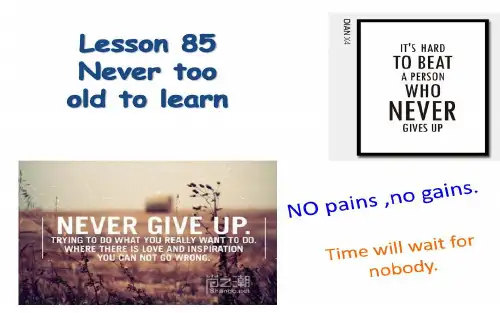
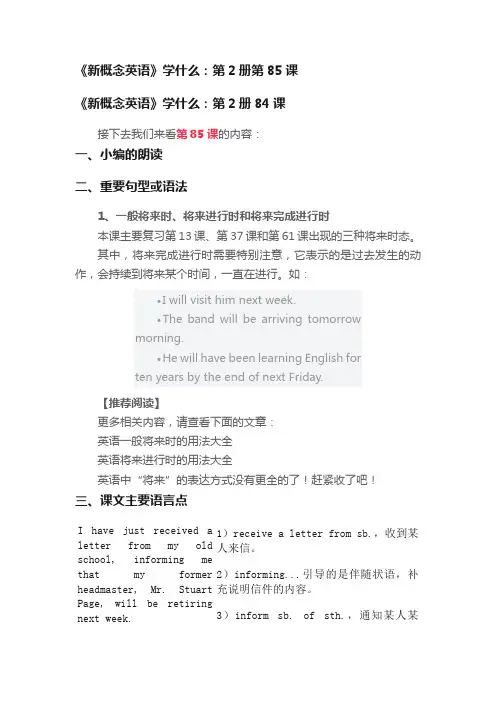
《新概念英语》学什么:第2册第85课《新概念英语》学什么:第2册84课接下去我们来看第85课的内容: 一、小编的朗读二、重要句型或语法1、一般将来时、将来进行时和将来完成进行时本课主要复习第13课、第37课和第61课出现的三种将来时态。
其中,将来完成进行时需要特别注意,它表示的是过去发生的动作,会持续到将来某个时间,一直在进行。
如: • I will visit him next week.• The band will be arriving tomorrowmorning.• He will have been learning English forten years by the end of next Friday.【推荐阅读】更多相关内容,请查看下面的文章:英语一般将来时的用法大全英语将来进行时的用法大全英语中“将来”的表达方式没有更全的了!赶紧收了吧!三、课文主要语言点I have just received a letter from my old school, informing methat my former headmaster, Mr. Stuart Page, will be retiringnext week.1)receive a letter from sb.,收到某人来信。
2)informing...引导的是伴随状语,补充说明信件的内容。
3)inform sb. of sth.,通知某人某事。
4)former ,前任的、之前的。
5)headmaster ,校长。
注意headmaster, director, president,principal, schoolmaster 的区别:这组词都可表示“校长”,但principal 通常指中学校长,也可指小学校长或大学院长;headmaster 指普通小学或中学的男性校长,在美国尤指私立学校的校长;director 不仅指学校的校长,还可指各组织机构、团体等的负责人,如处长、局长、主任、厂长等;schoolmaster 指小学、中学等一般学校的教师或校长;president 指大学校长。
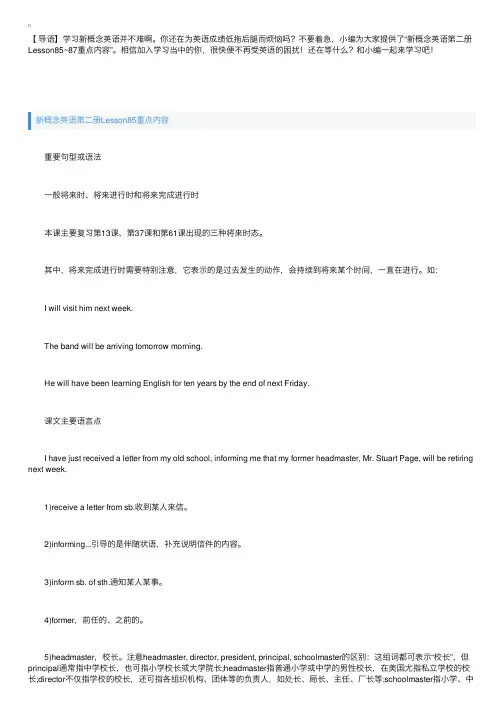
【导语】学习新概念英语并不难啊。
你还在为英语成绩低拖后腿⽽烦恼吗?不要着急,⼩编为⼤家提供了“新概念英语第⼆册Lesson85~87重点内容”。
相信加⼊学习当中的你,很快便不再受英语的困扰!还在等什么?和⼩编⼀起来学习吧!新概念英语第⼆册Lesson85重点内容 重要句型或语法 ⼀般将来时、将来进⾏时和将来完成进⾏时 本课主要复习第13课、第37课和第61课出现的三种将来时态。
其中,将来完成进⾏时需要特别注意,它表⽰的是过去发⽣的动作,会持续到将来某个时间,⼀直在进⾏。
如: I will visit him next week. The band will be arriving tomorrow morning. He will have been learning English for ten years by the end of next Friday. 课⽂主要语⾔点 I have just received a letter from my old school, informing me that my former headmaster, Mr. Stuart Page, will be retiring next week. 1)receive a letter from sb.收到某⼈来信。
2)informing...引导的是伴随状语,补充说明信件的内容。
3)inform sb. of sth.通知某⼈某事。
4)former,前任的、之前的。
5)headmaster,校长。
注意headmaster, director, president, principal, schoolmaster的区别:这组词都可表⽰“校长”,但principal通常指中学校长,也可指⼩学校长或⼤学院长;headmaster指普通⼩学或中学的男性校长,在美国尤指私⽴学校的校长;director不仅指学校的校长,还可指各组织机构、团体等的负责⼈,如处长、局长、主任、⼚长等;schoolmaster指⼩学、中学等⼀般学校的教师或校长;president指⼤学校长。
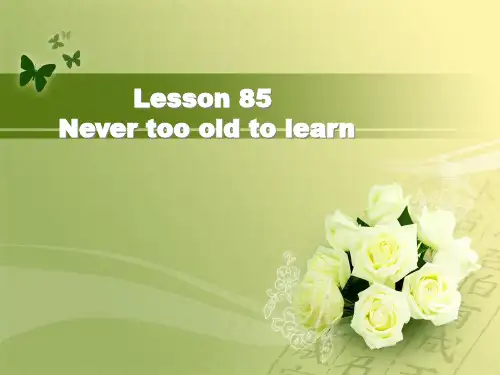
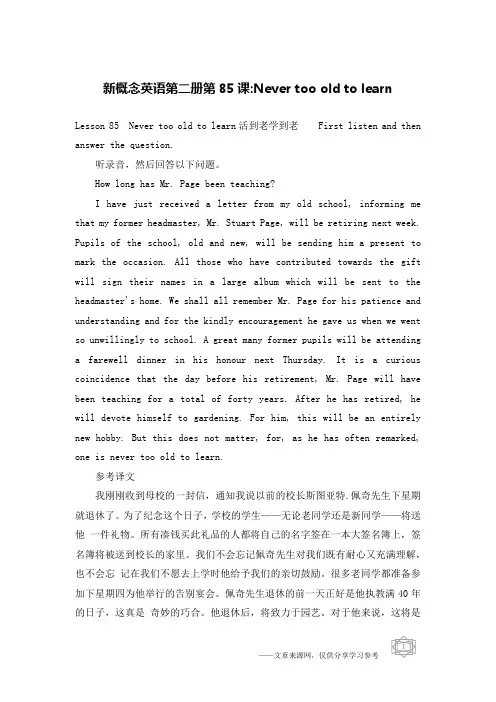
新概念英语第二册第85课:Never too old to learnLesson 85 Never too old to learn活到老学到老First listen and then answer the question.听录音,然后回答以下问题。
How long has Mr. Page been teaching?I have just received a letter from my old school, informing me that my former headmaster, Mr. Stuart Page, will be retiring next week. Pupils of the school, old and new, will be sending him a present to mark the occasion. All those who have contributed towards the gift will sign their names in a large album which will be sent to the headmaster's home. We shall all remember Mr. Page for his patience and understanding and for the kindly encouragement he gave us when we went so unwillingly to school. A great many former pupils will be attending a farewell dinner in his honour next Thursday. It is a curious coincidence that the day before his retirement, Mr. Page will have been teaching for a total of forty years. After he has retired, he will devote himself to gardening. For him, this will be an entirely new hobby. But this does not matter, for, as he has often remarked, one is never too old to learn.参考译文我刚刚收到母校的一封信,通知我说以前的校长斯图亚特.佩奇先生下星期就退休了。
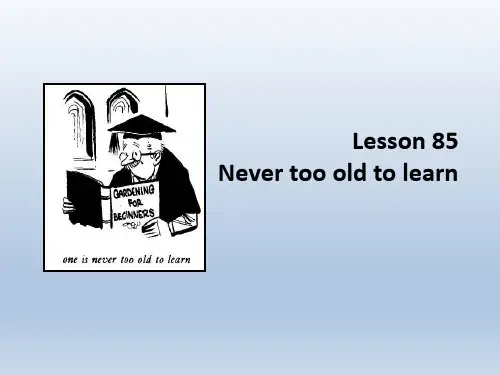
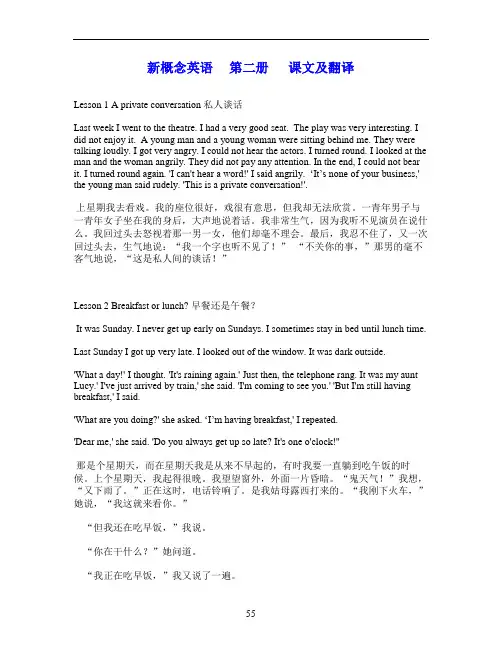
新概念英语第二册课文及翻译Lesson 1 A private conversation 私人谈话Last week I went to the theatre. I had a very good seat. The play was very interesting. I did not enjoy it. A young man and a young woman were sitting behind me. They were talking loudly. I got very angry. I could not hear the actors. I turned round. I looked at the man and the woman angrily. They did not pay any attention. In the end, I could not bear it. I turned round again. 'I can't hear a word!' I said angrily. ‘It’s none of your busi ness,' the young man said rudely. 'This is a private conversation!'.上星期我去看戏。
我的座位很好,戏很有意思,但我却无法欣赏。
一青年男子与一青年女子坐在我的身后,大声地说着话。
我非常生气,因为我听不见演员在说什么。
我回过头去怒视着那一男一女,他们却毫不理会。
最后,我忍不住了,又一次回过头去,生气地说:“我一个字也听不见了!”“不关你的事,”那男的毫不客气地说,“这是私人间的谈话!”Lesson 2 Breakfast or lunch? 早餐还是午餐?It was Sunday. I never get up early on Sundays. I sometimes stay in bed until lunch time. Last Sunday I got up very late. I looked out of the window. It was dark outside.'What a day!' I thought. 'It's raining again.' Just then, the telephone rang. It was my aunt Lucy.' I've just arrived by train,' she said. 'I'm coming to see you.' 'But I'm still having breakfast,' I said.'What are you doing?' she asked. ‘I’m having breakfast,' I repeated.'Dear me,' she said. 'Do you always get up so late? It's one o'clock!''那是个星期天,而在星期天我是从来不早起的,有时我要一直躺到吃午饭的时候。
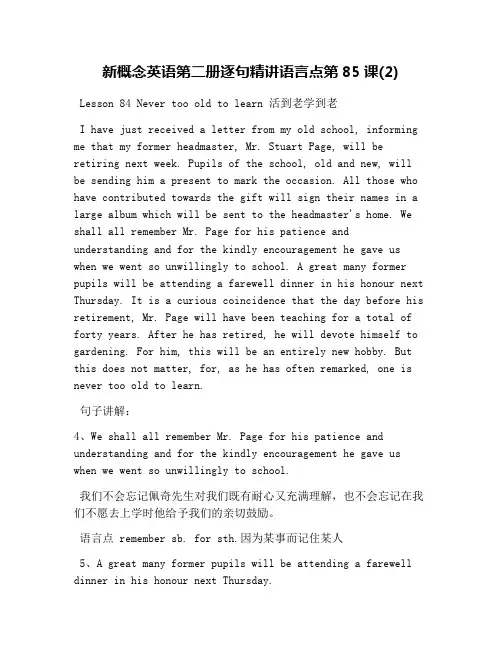
新概念英语第二册逐句精讲语言点第85课(2)Lesson 84 Never too old to learn 活到老学到老I have just received a letter from my old school, informing me that my former headmaster, Mr. Stuart Page, will beretiring next week. Pupils of the school, old and new, will be sending him a present to mark the occasion. All those who have contributed towards the gift will sign their names in a large album which will be sent to the headmaster's home. We shall all remember Mr. Page for his patience and understanding and for the kindly encouragement he gave us when we went so unwillingly to school. A great many former pupils will be attending a farewell dinner in his honour next Thursday. It is a curious coincidence that the day before his retirement, Mr. Page will have been teaching for a total of forty years. After he has retired, he will devote himself to gardening. For him, this will be an entirely new hobby. But this does not matter, for, as he has often remarked, one is never too old to learn.句子讲解:4、We shall all remember Mr. Page for his patience and understanding and for the kindly encouragement he gave us when we went so unwillingly to school.我们不会忘记佩奇先生对我们既有耐心又充满理解,也不会忘记在我们不愿去上学时他给予我们的亲切鼓励。
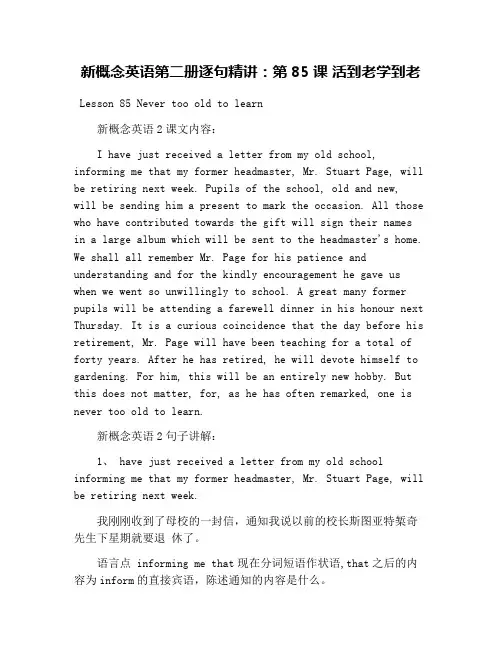
新概念英语第二册逐句精讲:第85课活到老学到老 Lesson 85 Never too old to learn新概念英语2课文内容:I have just received a letter from my old school, informing me that my former headmaster, Mr. Stuart Page, will be retiring next week. Pupils of the school, old and new,will be sending him a present to mark the occasion. All those who have contributed towards the gift will sign their namesin a large album which will be sent to the headmaster's home. We shall all remember Mr. Page for his patience and understanding and for the kindly encouragement he gave us when we went so unwillingly to school. A great many former pupils will be attending a farewell dinner in his honour next Thursday. It is a curious coincidence that the day before his retirement, Mr. Page will have been teaching for a total of forty years. After he has retired, he will devote himself to gardening. For him, this will be an entirely new hobby. But this does not matter, for, as he has often remarked, one is never too old to learn.新概念英语2句子讲解:1、 have just received a letter from my old school informing me that my former headmaster, Mr. Stuart Page, will be retiring next week.我刚刚收到了母校的一封信,通知我说以前的校长斯图亚特椠奇先生下星期就要退休了。
新概念英语第二册课文及翻译私人谈话Lesson 1 A private conversationLast week I went to the theatre. I had a very good seat. The play was very interesting. I did not enjoy it. A young man and a young woman were sitting behind me. They were talking loudly. I got very angry. I could not hear the actors. I turned round. I lookedat the man and the woman angrily(状语). They did not pay any attention. In the end, I could not bear it. I turned round again. 'I can't hear a word!' I said angrily. ‘It’snone of your business,' the young man said rudely. 'This is a private conversation!'.上星期我去看戏。
我的座位很好,戏很有意思,但我却无法欣赏。
一青年男子与一青年女子坐在我的身后,大声地说着话。
我非常生气,因为我听不见演员在说什么。
我回过头去怒视着那一男一女,他们却毫不理会。
最后,我忍不住了,又一次回过头去,生气地说:“我一个字也听不见了!”“不关你的事,”那男的毫不客气地说,“这是私人间的谈话!”】生词和短语【NEW WORDS AND EXPRESSIONS★private adj.私人的it's my private letter/house ;美式英语private school:私立学校英式英语:公学ETON (private school)privacy:隐私it's a privacy. adj.《Private Ryan》private soldier:大兵private life:私生Letter n. 首字母public:公众的,公开的public school ;public letter 公开信;public place :公共场所★conversation n.谈话uni verse转动uniformUni--bi--tri--quar-pent-sex/hex-sept-oct-nov---decBilateral trade 双边贸易triangle quarter pentagon sex 古罗马历法10个月---12凯撒大帝julis---July 七月屋大维augusto--August 八月September九月(原七月)---septwolvesOctober 十月(原八月)---octopusNovemberDecember---- decadesubject of conversation:话题辨析:conversation, dialogue, talk, chat这些名词均含“交谈”之意。
新概念英语第2册Lesson85课文翻译及词汇【课文】I have just received a letter from my old school, informing me that my former headmaster, Mr. Stuart Page, will be retiring next week. Pupils of the school, old and new, will be sending him a present to mark the occasion. All those who have contributed towards the gift will sign their names in a large album which will be sent to the headmaster's home. We shall all remember Mr. Page for his patience and understanding and for the kindly encouragement he gave us when we went so unwillingly to school.A great many former pupils will be attending a farewell dinner in his honour next Thursday. It is a curious coincidence that the day before his retirement, Mr. Page will have been teaching for a total of forty years. After he has retired, he will devote himself to gardening. For him, this will be an entirely new hobby. But this does not matter, for, as he has often remarked, one is never too old to learn.【课文翻译】我刚刚收到母校的一封信,通知我说以前的校长斯图亚特.佩奇先生下星期就退休了。
为了纪念这个日子,学校的学生——无论老同学还是新同学——将送他一件礼物。
所有凑钱买此礼品的人都将自己的名字签在一本大签名簿上,签名簿将被送到校长的家里。
我们不会忘记佩奇先生对我们既有耐心又充满理解,也不会忘记在我们不愿去上学时他给予我们的亲切鼓励。
很多老同学都准备参加下星期四为他举行的告别宴会。
佩奇先生退休的前一天正好是他执教满40年的日子,这真是奇妙的巧合。
他退休后,将致力于园艺。
对于他来说,这将是一种全新的爱好。
但这没有关系,因为正如他常说的那样,人要活到老学到老。
【生词汇总】inform v. 告诉,通知headmaster n. 校长contribute v. 捐助,援助gift n. 礼物,赠品album n. 签名簿,相册patience n. 耐心encouragement n. 鼓励farewell n. 告别honour n. 敬意coincidence n. 巧合total n. 总数devote v. 致力于gardening n. 园艺hobby n. 爱好,嗜好新概念英语第2册Lesson86课文翻译及词汇【课文】As the man tried to swing the speedboat round, the steering wheel came away in his hands. He waved desperately to his companion, who had been water skiing for the last fifteen minutes. Both men had hardly had time to realize what was happening when they were thrown violently into the sea. The speedboat had struck a buoy, but it continued to move very quickly across the water. Both men had just begun to swim towards the shore, when they noticed with dismay that the speedboat was moving in a circle. It now came straight towards them at tremendous speed. In less than a minute, it roared past them only a few feet away. After it had passed, they swam on as quickly as they could because they knew that the boat would soon return. They had just had enough time to swim out of danger when the boat again completed a circle. On this occasion, however, it had slowed down considerably. The petrol had nearly all been used up. Before long, the noise dropped completely and the boat began to drift gently across the water.【课文翻译】当那人试图让快艇转弯时,方向盘脱手了。
他绝望地向他的伙伴挥手,他的伙伴在过去的15分钟里一直在滑水。
他们两个还没来得及意识到究竟发生了什么事情,就被猛地抛入了海里。
快艇撞上了一个浮标,但它仍在水面上快速行驶着。
两个人刚开始向岸边游去,就突然惊愕地发现快艇正在转着圈行驶,它现在正以惊人的速度直冲他们驶来。
不到1分钟的工夫,它从离他们只有几英尺远的地方呼啸着驶了过去。
快艇过去之后,他们以最快的速度向前游去,因为他们知道快艇马上就要转回来。
他们刚刚来得及游出危险区,快艇就又转完了一圈。
然而这一次它的速度慢多了。
汽油几乎已经用光。
没过多久,噪音便彻底消失,快艇开始在水面上慢悠悠地漂。
【生词汇总】swing v. 转向speedboat n. 快艇desperately adv. 绝望地companion n. 同伙,伙伴water ski (由快艇牵引水橇)滑水buoy n. 浮标dismay n. 沮丧tremendous adj. 巨大的petrol n. 汽油drift v. 漂动,漂流gently adv. 缓慢地,轻轻地新概念英语第2册Lesson87课文翻译及词汇【课文】'At the time the murder was committed, I was travelling on the 8 o'clock train to London,' said the man.'Do you always catch such an early train?' asked the inspector.'Of course I do,' answered the man. 'I must be at work at 10 o'clock. My employer will confirm that I was there on time.''Would a later train get you to work on time?' asked the inspector.'I suppose it would, but I never catch a later train.''At what time did you arrive at the station?''At ten to eight. I bought a paper and waited for the train.''And you didn't notice anything unusual?''Of course not.''I suggest,' said the inspector, 'that you are not telling the truth.I suggest that you did not catch the 8 o'clock train, but that you caught the 8:25 which would still get you to work on time. You see, on the morning of the murder, the 8 o'clock train did not run at all. It broke down at Ferngreen station and was taken off the line.'【课文翻译】“在凶杀发生的时候,我正坐在8点钟开往伦敦的火车上。
”那人说。
“您总是赶这样早的火车?”探长问。
“当然是的,”那人回答。
“我必须在10点钟上班,我的雇主会证明我是按时到了那儿的。
”“晚一点儿的车也能送您按时上班吗?”“我认为可以,但我从来不乘晚一点儿的车。
”“您几点钟到的火车站?”“7点50分。
我买了张报纸,等着车来。
”“您没有注意到有什么异常情况发生吗?”“当然没有。
”“我提醒您,”探长说,“您讲的不是实话。
您乘的不是8点钟的火车,而是8点25分的,这次车同样能使您按时上班。
您看,在凶杀发生的那天早晨,8点钟的那次车根本没有发。
它在芬格林车站出了故障而被取消。
”【生词汇总】alibi n. 不在犯罪现场commit v. 犯(罪、错)inspector n. 探长employer n. 雇主confirm v. 确认,证实suggest v. 提醒truth n. 真相。